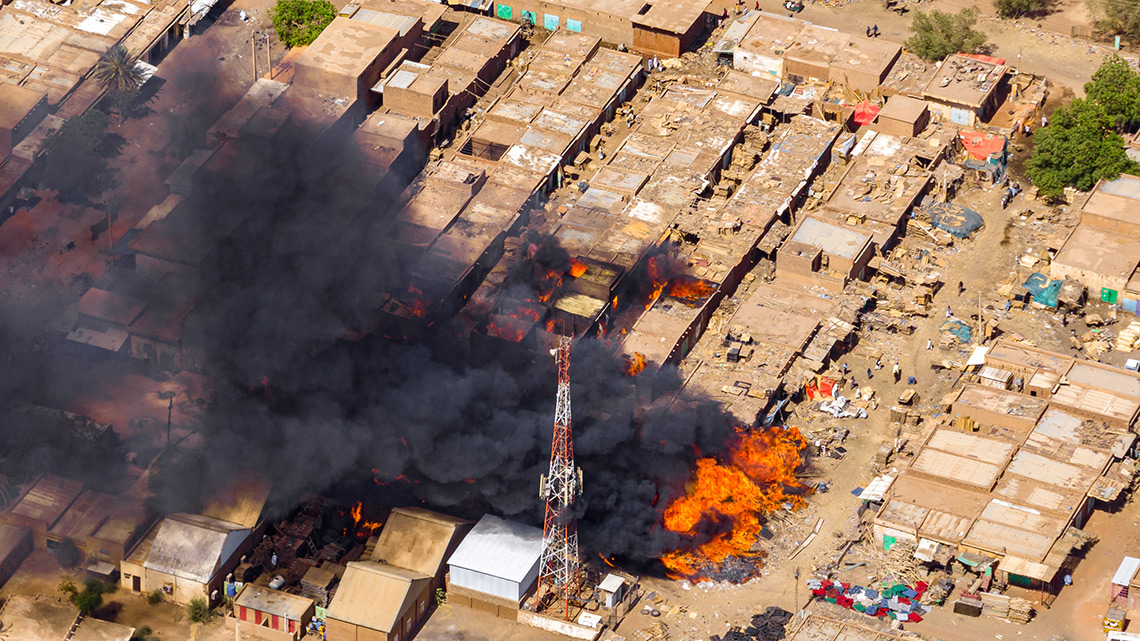
A South Sudanese bishop has warned that food has been weaponised during the civil war in Sudan, with famine now looming in his neighbouring country as a direct result of the conflict.
Speaking to the Catholic Bishops’ Conference of England and Wales, Bishop Alex Lodiong Sakor Eyobo of Yei, South Sudan, was critical of tactics being used in the war between the Rapid Support Forces (RSF) and the Sudanese Armed Forces (SAF). He said:
“They harass humanitarian agencies. And when humanitarian agencies are harassed, they stop delivering food because they also have to protect their own lives.
“The food aid sometimes is blocked by the RSF, not allowing them [the agencies] to enter. Because when you take food aid to the people, you are also going to feed their own enemies.
“So they use food as a weapon, so that once food is not delivered, their enemy is weakened. That’s their point of view.”
Bishop Alex said that “the famine is not because there is drought, it’s because of the conflict”:
“The problem of the famine is that Sudan cannot produce because people are on the run. So, when someone is on the run, you have nothing to produce for yourself. If you run, you leave your belongings behind; you have no money, even to buy food because as a displaced person, where do you get your money?
“Even if there is food available in the market, you have no means to buy it. So that’s why it is difficult and that’s why there is famine. People are moving, they are being chased from their places, they cannot produce food, and since they cannot produce food, that sets up the place for famine.”
The bishop said that the war would only make things worse and was critical of the ruling elites during a conflict that has, according to United Nations agencies, left approximately 15,000 dead, 8.6 million forced from their home, 25 million in need of humanitarian assistance, 18 million facing severe hunger and 3.5 million children suffering from acute malnutrition.
He said:
“War aggravates the problem. And even the Holy Father when he was talking about Iraq, Afghanistan and Israel, said that ‘war is a defeat’. If human beings want to engage in war, it is a defeat. It is not a success; you will never succeed in war.
“Life is being destroyed, property is being destroyed and before you realise, everything is gone. And to reconstruct is not going to be very easy. So, our appeal is that the humanitarian community becomes proactive, acts fast, so that these issues are handled.”
He added:
“We engage the local communities that are being fragmented as a result of war so that they are not used by the elites. Because the elites use our people for their own gain and our people are then the ones who suffer.”
Bishop Alex asked for support from Catholics in England and Wales, appealing for advocacy and financial assistance:
“I ask that you advocate about the issues that are going on in Sudan and South Sudan. Advocacy is very important. Because there are many people who don’t know about what is going on.
“Number two, the Church in England and Wales could also mobilise resources and send them to us, to support our local efforts. Our Caritas also needs support so that it can help with the aid and the local food deliveries.”
The Sudan and South Sudan Catholic Bishops’ Conference released a statement following a meeting in Juba on Saturday 29 June calling for peace and preparation for post-conflict trauma healing, rehabilitation and reconstruction.
They said: “The fabric of Sudanese society has been torn apart, with people shocked, traumatised, and disbelieving about the level of violence and hatred.”
Bishop Paul Swarbrick, Lead Bishop for Africa at the conference, has frequently raised his concerns about the issues in Sudan.
In response to Bishop Alex’s comments, Bishop Paul said:
“It is essential to resolve the Sudanese conflict as quickly and effectively as possible. As other conflicts gain a lot of media attention, Sudan’s war is already spilling out to destabalise neighbouring countries and South Sudan is increasingly affected.
“Earlier this year I had an encouraging response from British ministers in terms of practical aid and as well as political intervention. I also heard from Bishop Carlassare of Rumbek.
“The presence of the Church even during times of political instability and food insecurity is a reason to keep hope alive. Christ has not abandoned the people. Our prayers are with our sisters and brothers. We do what we can to offer encouragement.”
To give to CAFOD’s emergency Sudan appeal, click here.